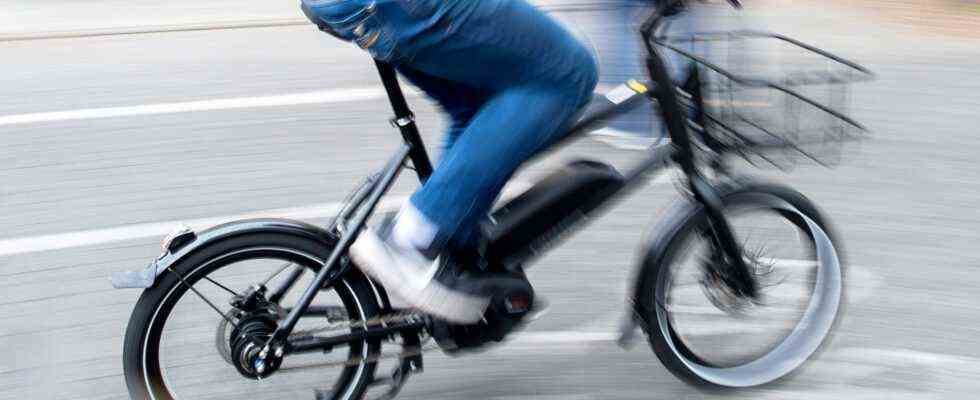Status: 08/12/2021 5:34 p.m.
What should the city centers of the future look like? This will be discussed at the Transport Congress in Berlin. It would be worth taking a look at where mobility has long been the focus: Karlsruhe.
Bicycles – Karlsruhe seems full of them: cargo bikes, racing bikes, touring bikes. At lamp posts, at full speed in the city center or parked in one of the bicycle stations. It is not for nothing that Karlsruhe regularly wins: the German Bicycle Prize, the top spot in the bicycle climate test of the General German Bicycle Club or the award as a bicycle-friendly municipality by the state of Baden-Württemberg.
But bicycles alone do not turn the mobility around, says Mayor Frank Mentrup. It depends on the individual pieces of the puzzle. And that these interlock seamlessly. “You can now take your bike with you on the train after nine o’clock in the morning, for example,” emphasizes Mentrup. “When I ride my bike to work in the city in the morning, I know: If it rains in the afternoon, I’ll still get home dry.”
Pieces of the traffic turnaround puzzle
In fact, a lot has happened in the city of around 300,000 in recent years. Not only is their bicycle share in the mobility mix at over 30 percent – the Karlsruhe CarSharing network is the largest in Germany with almost three cars per 1000 inhabitants. And in the coming year, a tunnel should be ready to bring cars and trams underground in the city center, thereby creating more space for pedestrians. A billion dollar project that hits the zeitgeist – because the car is no longer the sole focus of contemporary traffic planning.
“We have to rethink, because when the population increases, so does the need for mobility. If we continue to rely solely on cars, we have to widen roads, create an infrastructure – there is so much space and not available,” says the mayor. In addition, there are also growing demands of the citizens for a different use of the available space: “They no longer drive into the city just to go shopping, they want to experience something there, enjoy something. And that needs space.”
A problem of acceptance
And it takes people who are also willing to leave their car behind and take on new offers. Martin Kagerbauer works at the Karlsruhe Institute of Technology (KIT). His field of activity: transport – and how to get it to people.
Because the traffic turnaround is “a delicate plant” and routines are difficult to break through, says Kagerbauer: “Of course it is great if we expand the range of transport options and offer people a large mix of car sharing, bicycle stations and modern local public transport. But the best offer is of no use if it doesn’t get into people’s minds, if they still leave the house automatically and get into their car parked in front of the door. “
Hope for autonomous vehicles
A group from the Informatics Research Center recently demonstrated that many people would be ready to rethink their approach with the EVA shuttle, an autonomously driving mini bus. “The special thing about EVA is that the buses do not go to fixed stops, as many other autonomous vehicles already do, but that they get to where people need them,” explains Johanna Häs.
The buses can be called via the app, collect people and take them, for example, to the next public transport stop or home from there. This system was tested in a pilot project until the end of July. “The demand was huge,” enthuses Häs: “We had five times as many inquiries as we could make trips.”
Even if the test phase has now been completed and no autonomous mini-buses are currently driving through Karlsruhe, she sees such decentralized solutions as an important component for the mobility of the future. “The buses are always ready, can be called day and night, do not need a driver if it is legally permitted at some point and are also environmentally friendly because they are electrically operated. If we network many such small projects with one another, we create a reliable, sustainable one Mobility, “says Häs.
Kagerbauer from KIT also welcomes it when the range of offers is growing steadily. However, experience has shown that some pressure is required for these to be accepted. The researcher emphasizes: Politicians have to create the right framework, I don’t like the word ‘bans’ that much. But 30 euros for residents’ parking is a joke. “With today’s competition for space, it should actually cost ten or even a hundred times as much for this precious space.
“Make it easy”
Or you need someone who is willing to make yourself unpopular. Last year, Lord Mayor Mentrup had 120 parking spaces removed on a busy street – in favor of a bicycle lane. “No one would have dared to do that five years ago,” he is convinced. “But you just have to do it. Because if we are really serious about wanting to redistribute public space, we also have to take measures to control this change.”
Most of the residents have now resolved their concerns. So far everyone has found a parking space. Just maybe a few meters away.
A look at the election programs – mobility
Marcel Heberlein, ARD Berlin, July 23, 2021 4:59 p.m.

